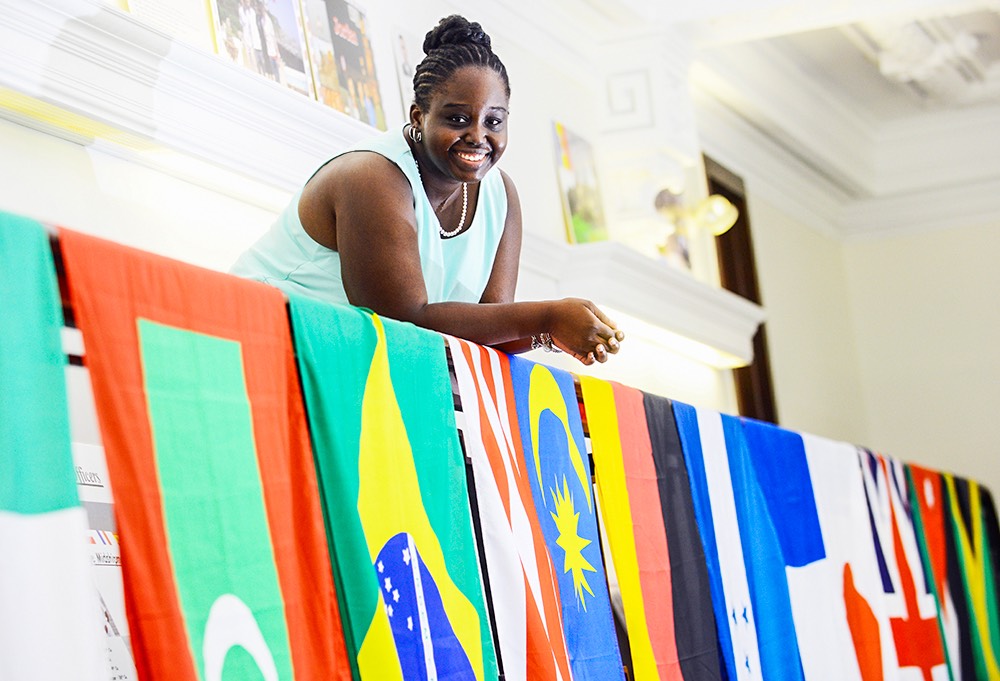Interview with Briayna Cuffie

R4S: Briayna, could you briefly describe your family background?
BC: On my father’s side I have three living aunts and an uncle; originally, there were six of them, total. They are all from the eastern shore of Maryland, which is where my paternal grandmother's family originally lived. In the era of sharecropping, and secondary servitude work, my paternal grandfather came from either North Carolina, South Carolina and moved up here to Maryland for work.
My maternal grandparents came from Southern Maryland. My grandmother was one of seventeen children. They were sharecroppers, so they moved around every few years when the land-owners decided they didn't want to allot a share of the land to the families that tilled it. They then had to uproot and move, and they eventually ended up in the Annapolis area. So, five generations here total.

My maternal grandmother was the only one of the seventeen to go to school past middle school. She also ended up being the only one to graduate high school and go to technical college.
My paternal grandmother didn't have an education past middle school. My dad started out at community college - same with most of my cousins. They have done well for themselves though, and were able to get into permanent jobs with the state. I am the first on that side of the family to go to a four-year university, so I am a first-generation student.
R4S: There is a saying, “Just as wealth can be passed down the generations, so too can poverty.” Would you agree?
Poverty in the black community is absolutely inherited. Compared to a middle-class white family, which has the wherewithal to send a child to a good school, pay for activities that strengthen scholarship and get that child through college – in the black community, it takes an entire village of people and their combined resources to get a black child just through high school and then only a small percent can then go on to college.
I was effectively raised by a single mom since my dad worked three jobs to make ends meet until I went to college. When I turned fourteen, I got a work permit. During the school year I was working two jobs; in the summer I was usually working three. This way I could not only not pay for things I needed or wanted, like school uniforms and supplies, but could help contribute to the household as well.
Poverty in the black community is different from poverty in the white community. Jim Crow, then redlining and predatory lending practices over many generations have prevented many black families, including mine, from passing down familial wealth in the in the form of property, housing, and of course, the opportunity to start at zero, instead of in the negative, financially.
R4S: You've been enormously successful in your life. I wonder if you have faced any roadblocks to your success due to being African American and how you have approached those challenges?
Access to a good education was the main challenge. I was a very smart, very nerdy kid, and I was outpacing my elementary school’s programs. My family did not have the financial resources to put me into a private school, so I relied on supplemental education activities my family elders led at home.
There's this whole notion of the American dream. You know, you pull yourself up by your boot straps, you bust your butt working and getting your education. And there's going to be this great outcome after you graduate. That was not true for me or for any of my brown or black peers. Even Martin Luther King Jr. stated “It’s all right to tell a man to lift himself by his own bootstraps, but it is cruel jest to say to a bootless man that he ought to lift himself by his own bootstraps.”
Everyone I knew at school and in my communities, both white and of color, upon graduation, were asking, “Are you going to work directly for the NSA or the State Department?” It took a toll on my morale, to tell everyone that despite my having a 3.0 GPA and doing six internships while working three campus jobs for four years, I still was striking out with job applications. It made no sense; my white friends who had the same GPA but maybe only one internship under their belt, were getting job offers left and right. I had helped them write papers or understand the coursework when they were stuck – yet I was getting left behind. I finally landed my dream job, but I believe I had to work twice as hard to accomplish that.
R4S: Do you have more examples of that dynamic?
Yes. There is a saying that as a person of color, you have to work twice as hard to get half as far – and that has definitely been my experience. It’s even more complicated for poor people of color, in ways a middle-class white person might not consider.
For instance, with my working two and three jobs, and not having a car, I always had to hitch my schedule for someone else's - my grandfather's, my cousin’s, anyone who was willing to drop me off or pick me up. The thought of getting a job did not cross many of my classmates’ minds. They just went to school and some played a sport.
Whereas I went home to change for work, did some homework, went to work for anywhere between four to six hours, came home, finished my homework, and would also work all, and every, weekend. So, I think the extreme level of effort I’ve needed to make to get to what middle-class white people would consider “baseline normal” is what has been my main barrier. However, I’ve risen to the challenge. Then, and even know, I minimize asking my parents or family members for any assistance because they were already struggling and some still are.
R4S; Let’s talk about the costs of education. How would you compare yourself to your white peers in the same field in terms of education debt?
I don’t believe any of my white peers have six-digit debt. The ones I am aware of have maybe a max of $70,000 in debt. A lot of their parents had started 529s when they were kids, or additional long-term savings; I don’t think my parents had even heard of a 529 at the time I was born. Additionally, my white friends didn't have to buy their own textbooks and a good chunk of my friends did not have on-campus jobs or even off-campus jobs. The few that did, the income was their “play money.” They didn't have to send chunks of their money home to help make ends meet. My debt affects the way financiers look at my financial profile.
R4S: What are your views on reparations for slavery?
I think it is an important idea, and a great one. While governmental reparations seem out of reach now, I think if individual reparations caught on, the Federal government would eventually have to look at its priorities and be willing to take the lead from its citizens.
Tremendous harm has been done to the African American community; giving people a leg up so that they can contribute to society in a more complete and useful way is what is needed at both the individual and societal level – not just for African Americans but for indigenous populations as well.
Think of the positive domino effect that could be created if even just a few people received reparations and could break out of poverty and could contribute in a more effective way to the betterment of society. For instance: more time to mentor, aid others in their families and lift them up – work towards ensuring the cycle of impoverishment ends with their generation.
R4S: What has it been like for you to receive reparations yourself? What has been the best form of reparations in your opinion?
Two white women are helping me pay down my 6-figure education debt. That alone will be hugely helpful in leveraging my progress.
Also, I think in-kind donations of goods and services is critical to the black community.
Beyond monetary reparations, I’ve really appreciated people’s willingness to dive into the omitted sections of history books, to piece together the true past whether it be their family’s history of enslavement or better understanding the states’ and federal government’s roles.
White people’s lack of willingness to look at their own history has been hard on my mom's generation, my grandfather's generation, to the point that many have become tired of talking, or given up altogether.
Hearing white people say, “You know what? I want to put my money where my mouth is, now that I understand” has a true healing effect. As a person of color, many of us feel like we are running on a treadmill, but not really getting anywhere. It’s encouraging to hear white people saying, “Here's what I can do. Here's the resource is I can provide to leverage your progress.” Even tiny steps – like white people acknowledging and talking about institutional racism –incremental change in thinking gets us one step further.
R4S: How would you advise white people who are new to this path? They’ve just found out that their families have enslaved people in the past, they want to make a difference. What should they do? Why is making reparations important?
You need to know that the value of our labor – the sweat of African-Americans – is the basis of your wealth, the reason your families have prospered. Dive into your family history, learn the truth, and encourage others to do the same. You acknowledge your wealth – monetary and other accessible resources—and utilize it on a daily basis, why not acknowledge where it came from and show gratitude? What was coerced out of the generations of ancestors that came before me, can’t even be compared to an interest-free loan or in-kind donation. What can you do to recognize this injustice? Reparations can be made in many ways. That journey starts with acknowledgement.



